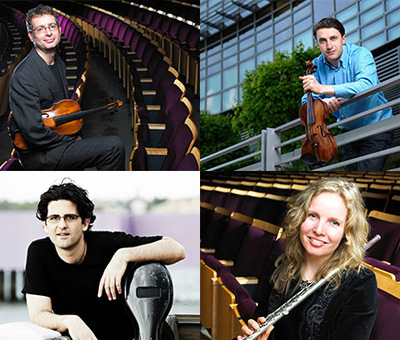Chamber music concert at CMU featured Bach's Goldberg Variations arranged for string trio
Nov 19, 2013 · 2 minute read · 0 CommentsCarnegie Mellon UniversityPittsburgh Symphony OrchestraPittsburghmusicfluteBaroque fluteviolinviolacelloWolfgang Amadeus MozartJohann Sebastian BachGoldberg Variations

David Harding, Noah Bendix-Balgley, Lorna McGhee, Amit Peled
I attended a special chamber music concert at CMU that featured some truly excellent musicians.
The musicians
I was particularly interested in seeing Lorna McGhee, the current principal flute of the Pittsburgh Symphony Orchestra, and violinist Noah Bendix-Balgley, the concertmaster, both of whom are relatively recent additions to the orchestra. The other two musicians, also fantastic, were violist and CMU professor David Harding and cellist Amit Peled.
Mozart’s flute quartet no. 1 in D major
Lorna McGhee played in the first part of the program, which was Mozart’s first flute quartet. I was very curious how she would approach the work, because I’m very picky nowadays about the performance of music from the 18th century or earlier, which I far prefer to be both on period instruments and in period style. The typical “modern” performance I can no longer enjoy, because of stylistic anachronisms that in my mind invalidate the beauty and freshness of early music.
I enjoyed the quartet’s performance of the Mozart. The playing was crisp, lively, and transparent. There was little to quibble with in Lorna McGhee’s performance: she played with verve, sensitivity, and clarity. In some phrases she held a legato longer than I would like, but overall I quite liked the performance.
Bach’s Goldberg Variations arranged for string trio by Dmitry Sitkovetsky
The bulk of the program was devoted to a performance by the string trio of the entire Goldberg Variations by Bach.
In the past quarter century, I’ve listened to countless performances of the Goldberg Variations on all kinds of keyboard instrument, including harpsichord, fortepiano, and modern piano, but until tonight, I hadn’t bothered listening to Sitkovetsky’s arrangement for string trio that came out several years ago.
I thought it worked out pretty well tonight, with the three string players working really hard to create dynamism and contrast along with unity in this monumental work. I couldn’t help but think that it’s actually harder to pull off as a trio than as a solo keyboard piece. What was particularly interesting was visually seeing and hearing (in the different tonal qualities) all the different voices in the music. They are there in the original version, of course, but experiencing the spatial separation just made me even more amazed by Bach’s creation.
Conclusion
I appreciate the time the four musicians took to perform in this chamber music recital free to the public, and thank you, CMU, for bringing them in for these invigorating performances of Mozart and Bach!